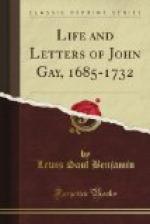and says the supposed author of it is Dr. Swift.
But, above all things, he praises the
Tatlers
and
Spectators, and I believe Steele and Addison
were privy to the printing of it. Thus is one
treated by the impudent dogs.” In this
unambitious little sketch, as the author puts it,
he gives “the histories and characters of all
our periodical papers, whether monthly, weekly or
diurnal,” and it is, therefore, of value to
the student of the early days of English journalism.
He claimed to write without political bias: “I
shall only promise that, as you know, I never cared
one farthing either for Whig or Tory, so I shall consider
our writers purely as they are such, without any respect
to which party they belong.” In “The
Present State of Wit” most of the better-known
periodical writers are introduced. Dr. William
King is mentioned, not he who was the Archbishop of
Dublin, nor he who was the Principal of St. Mary Hall,
Oxford, but he of whom it was said that he “could
write verses in a tavern three hours after he could
not speak,” who was the author of the “Art
of Cookery” and the “Art of Love,”
and who in 1709 had fluttered the scientific dovecotes
by parodying the “Philosophical Transactions”
in the
Useful Transactions in Philosophy and Other
Sorts of Learning, of which, however, only three
numbers were issued. John Ozell was pilloried
as the author of the
Monthly Amusement, which
was not, as the title suggests, a periodical, but
was merely a title invented to summarise his frequent
appearances in print. “It is generally some
French novel or play, indifferently translated, it
is more or less taken notice of, as the original piece
is more or less agreeable.” Defoe takes
his place in the gallery as the editor and principal
contributor to the weekly
Poor Review, that
is, the
Weekly Review (which was published
weekly from February 19th, 1704, until 1712) which,
says Gay, “is quite exhausted and grown so very
contemptible, that though he has provoked all his
brothers of the quill round, none of them will enter
into a controversy with him.”
The periodical publications of the day are passed
under review: the Observer, founded in
1702 by John Tutchin, and after his death five years
later, conducted by George Ridpath, editor of the Flying
Post, until 1712, when it had almost entirely
ceased to please, and was finally extinguished by
the Stamp Tax; the weekly Examiner, set up
in August, 1710, in opposition to the Whig Taller,
numbering among its contributors Dr. King, St. John,
Prior, Atterbury, and Freind, and managed by Swift
from No. 14 (October 26th, 1710); the Whig Examiner,
the first issue of which appeared on September 14th,
1710, its five numbers being written by Addison; the
Medley, another Whig paper, which ran from
August, 1710, to August, 1711, and was edited by Arthur
Mainwaring, with the assistance of Steele, Oldmixon,
and Anthony Henley (a wit and a man of fortune, to




